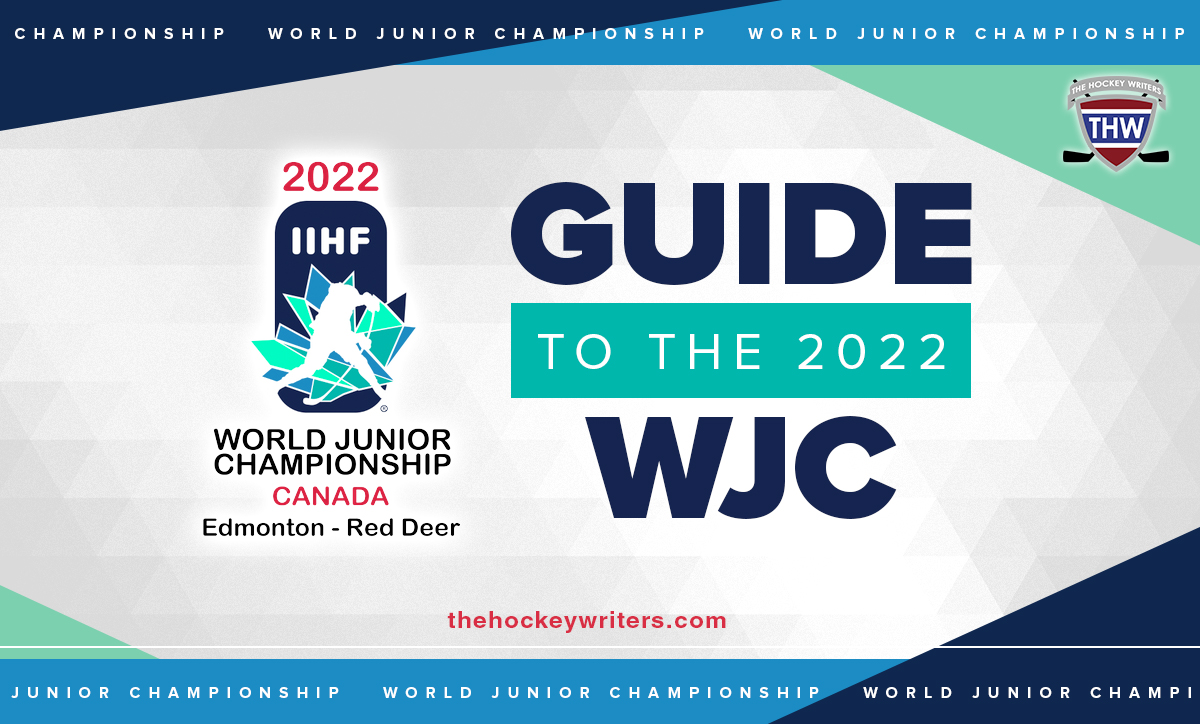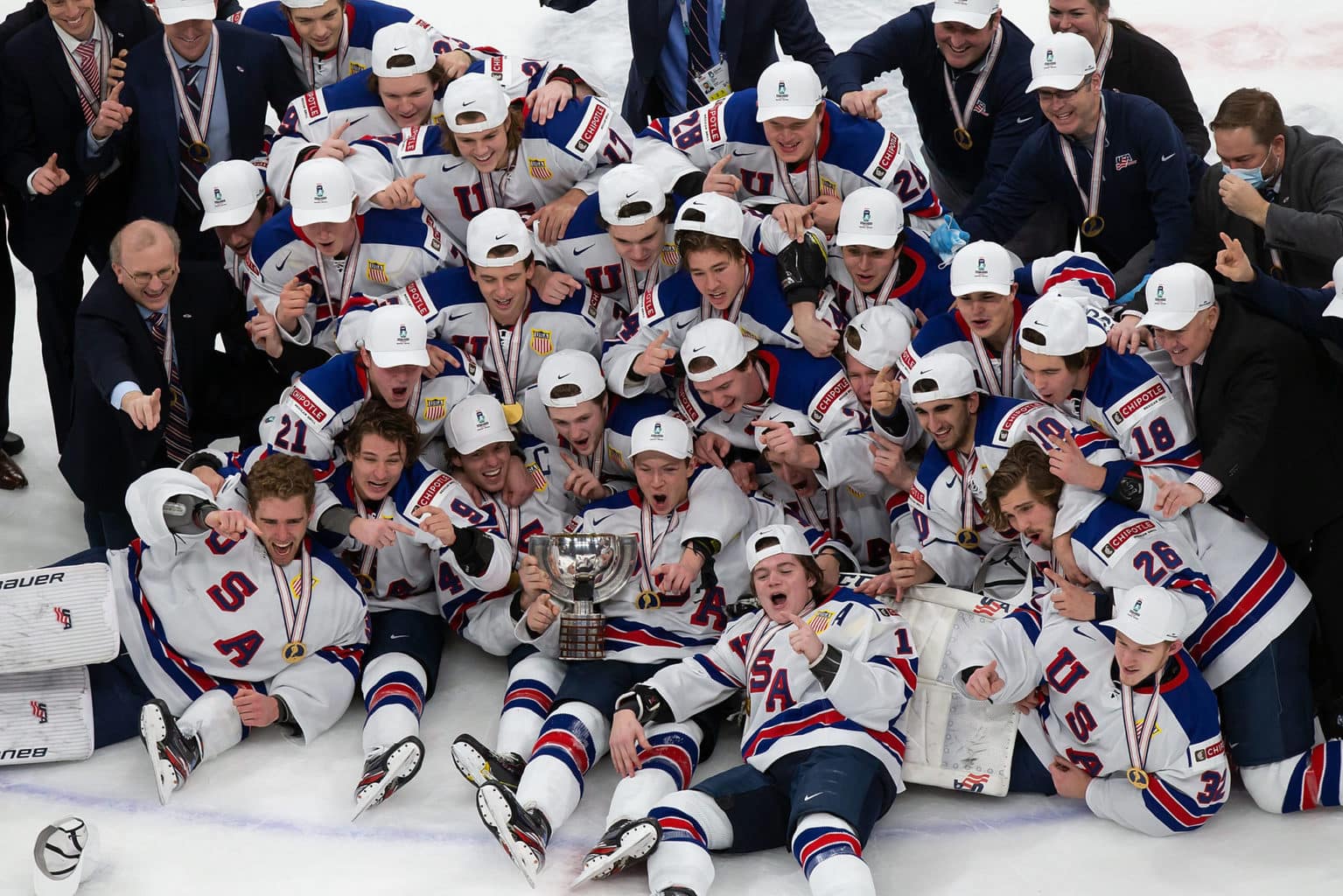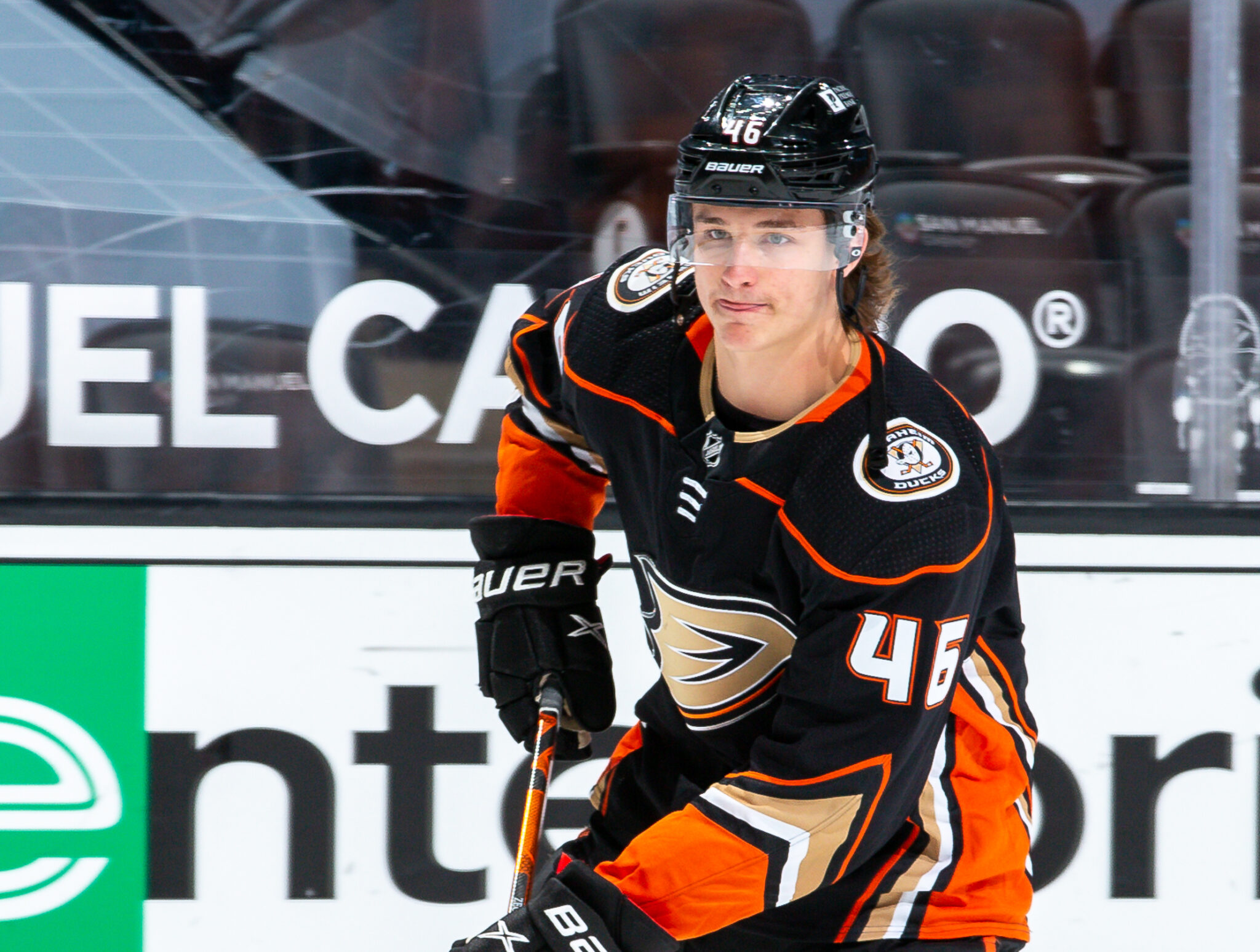We’re now in December and you know what that means? That’s right! It’s the most wonderful time of the year as the 2022 World Junior Championship is quickly approaching.
Hockey fans anxiously wait for this event as it has been a holiday tradition and has grown tremendously since it’s first official tournament in 1977. While last year’s tournament was different than what we’ve seen in the past, it was still an exciting one to remember. This year’s tournament should provide, or even elevate, the same level of competition.
Related: THW 2022 World Junior Championship Coverage
With no bubble and the expectation that fans will be allowed to enter the arenas, it provides a sense of normalcy that we’re used to before the pandemic. Seeing fans cheer for their country at a major international event is going to mean so much more this time around. The tournament will start on Dec 26 with Finland and Germany kicking things off and things conclude on Jan 5 with the gold medal game.
Edmonton and Red Deer Remain as Host
Even though they served as the host for last year’s tournament, Edmonton and Red Deer remain as the hosts for the 2022 tournament. Initially, the tournament was scheduled to be in Gothenburg, Sweden. The games will be played at Rogers Place, home of the Edmonton Oilers, and ENMAX Centrium, home of the Red Deer Rebels.

Due to the pandemic where there was a bubble format and no fans in the arena last year, this is an opportunity for them to have that fan interaction now that cases have been relatively low compared to the previous year. While hockey was still able to be played, it wasn’t the same without the fans attending and rooting for their teams.
With fans being allowed to enter and watch the games this year, it’s very much following the lines of how the NHL has done a respectable job of having strong protocols in place for fans in the arena. Hockey Canada has stated that fully vaccinated ticket holders will be able to attend, while playing under a National Interest Exemption.
Gothenburg will still get their hosting duties as they will be the host for the 2024 tournament. Russia will be the host for next year’s tournament with Omsk and Novosibirsk as the cities where the games will be played.
Participating Teams
Usually there would be a team that is relegated at the end of the tournament from the previous year. However, due to different circumstances with the pandemic, the team that would’ve been relegated still gets to participate in this year’s tournament.
That team would’ve been Austria who finished 10th last year and would’ve been relegated had the original rules been in place and another team would be promoted to the top group. This year they remain and have another opportunity to compete.
Group A will be based in Red Deer and will consist of USA, Russia, Sweden, Slovakia and Switzerland. Group B will be based in Edmonton and that group includes Canada, Finland, Germany, Czech Republic and Austria.
Team USA will look to defend their title as there will be a number of players that can compete and battle for a spot, including a number of players up for the 2022 draft. Canada fell short of a perfect tournament last year, but will ice another deep roster, as they look to avenge last year’s second place finish. Both teams will be without key members from the previous year, but the talent still remains.

William Eklund will look to be a driving force as Sweden looks to bounce back after a disappointing finish, losing in the quarter-finals. Eklund missed out on last year’s tournament after testing positive for COVID-19 and will look to be one of Sweden’s leaders this year. Russia is also another team that had a disappointing finish where they had a talented group, including star goaltender Yaroslav Askarov. Having a young phenom and top prospect in 2023 Matvei Michkov will certainly be an added bonus.
Award Winners from 2021 WJC
Ottawa Senators third overall pick in 2020 Tim Stützle was named top forward at the tournament. While Germany had a rough start dealing with a COVID-19 outbreak, it was Stützle who led the way no matter what situation the team faced. He tied for first in team scoring with 10 points and finished tied for third overall in tournament scoring. He was always a game breaker and a major reason why Germany made it to the quarter-finals and gave Russia a good run, falling 2-1.
For the second straight year, a Toronto Maple Leafs defenseman won the best defenseman award. Third-round pick (64th overall) Topi Niemelä got that honour after Rasmus Sandin won it in 2020. He was above a point per game at the tournament with eight points in seven games. Finland had strong depth on defense and Niemelä wowed everyone with his play at both ends of the ice. He ended up playing big minutes and was essential to help Finland capture bronze.
In a tournament that featured Askarov and Spencer Knight, it was Devon Levi that stole show as the tournament’s top goaltender. Coming into camp as an unknown, Levi made his presence felt becoming the starter for the Canadians. Selected by the Florida Panthers 212th overall in 2020 –now with the Buffalo Sabres– Levi owned the top save percentage .964 and goals against average with 0.75 and allowed the fewest goals against with five. Even with those numbers, Canada fell short and won silver.

It was an all-out battle between Dylan Cozens (Buffalo Sabres) and Trevor Zegras (Anaheim Ducks) as both players put on an offensive clinic at the tournament. However, Zegras ultimately gained an edge as his two points in the gold medal game put him on top as tournament MVP. The Ducks’ ninth overall pick in 2019 absolutely dominated with 18 points in seven games and 25 shots on goal. He was the driving force for the Americans’ offense from beginning to end, helping the team capture their fifth title at the tournament.
Levi, Bowen Byram, Ville Heinola, Zegras, Stützle and Dylan Cozens were all selected as the tournament’s media all-stars.
2022 WJC Schedule
If you want to follow a specific team or game, here is a full schedule of the games in the tournament, including all medal round games. All games will be broadcasted on the NHL Network (United States) and TSN (Canada).
Dec 26
Finland vs. Germany (2 p.m. ET)
Russia vs. Sweden (4:30 p.m. ET)
Czech Republic vs. (Canada 7 p.m. ET)
United States vs. (Slovakia 9:30 p.m. ET)
Dec 27
Austria vs. Finland (2 p.m. ET)
Russia vs. Switzerland (4:30 p.m. ET)
Germany vs. Czech Republic (7 p.m. ET)
Sweden vs. Slovakia (9:30 p.m. ET)
Dec 28
Switzerland vs. United States (4:30 p.m. ET)
Austria vs. Canada (7 p.m. ET)
Dec 29
Finland vs. Czech Republic (2 p.m. ET)
Slovakia vs. Russia (4:30 p.m. ET)
Canada vs. Germany (7 p.m. ET)
Sweden vs. United States (9:30 p.m. ET)
Dec 30
Czech Republic vs. Austria (4:30 p.m. ET)
Slovakia vs. Switzerland (7 p.m. ET)
Dec 31
Germany vs. Austria (2 p.m. ET)
Switzerland vs. Sweden (4:30 p.m. ET)
Canada vs. Finland (7 p.m. ET)
United States vs. Russia (9:30 p.m. ET)
Jan 2
Quarterfinal 1 (2:30 p.m. ET)
Quarterfinal 2 (5 p.m. ET)
Quarterfinal 3 (7:30 p.m. ET)
Quarterfinal 4 (10 p.m. ET)
Jan 4
Semifinal 1 (3 p.m. ET)
Semifinal 2 (7 p.m. ET)
Jan 5
Third-place game (4 p.m. ET)
Championship game (8 p.m. ET)

Hockey has been a big part of my life since watching my first Leafs game to currently coaching minor hockey. I previously interned at The Hockey News and worked on Toronto Marlies broadcasts for Rogers TV. Aside from hockey, I also enjoy drumming, animation and impressions/ voices.
